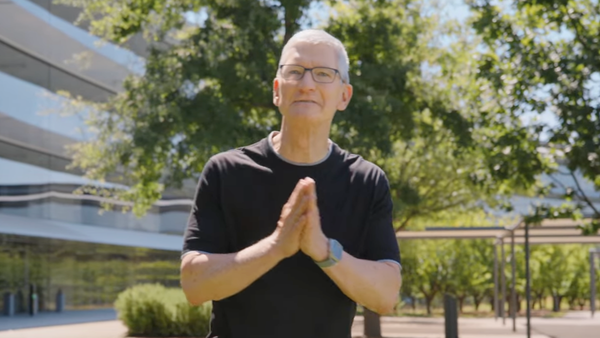
Things aren’t looking great on the climate front. Despite decades of talking about the need to reduce emissions, the greed of fossil fuel companies and their grip on our governments has limited the scope of global action to address the crisis. A new report from the Intergovernmental Panel on Climate Change (IPCC) that synthesizes the past several years of scientific research lays out the reality we’re facing in stark terms: not only are we on a trajectory to blow past 1.5ºC of warming without immediate and drastic action, but if we build all the fossil fuel infrastructure currently planned, there’s an 83% chance we’ll pass the 2ºC threshold too.
If it’s not obvious, that’s a real problem. The planet has already warmed 1.1ºC above pre-industrial levels and we’re already experiencing increasingly devastating natural disasters, heat waves, and droughts the world over. But once we pass 1.5ºC, the effects of climate change start to rapidly escalate. After that milestone, there’s also a much greater chance that we hit tipping points like the collapse of major ice sheets that make it much harder to reverse what we’ve done to the planet. They can also set off feedback loops where large quantities of naturally stored carbon gets released, further speeding up the rate of warming and setting off even more of those tipping points.
We’re entering into dangerous territory here, and it needs to be said that the tech industry isn’t helping matters. When I talk about the impacts of the tech industry in transportation, one of the important factors I discuss is its role in distracting policymakers and the public from low-tech solutions that could actually address problems like traffic and road deaths in favor of fantastical high-tech solutions that promise to solve everything, but are often never realized and can even make the situation worse.
On the climate front, new technology is positioned as a central part of the solution, but I’d argue it’s actually used as a delay tactic. A magical tech solution is constantly on the horizon, and it provides an excuse to not make the structural changes to our society that are necessary to address the crisis. It also happens to work out really well for vested interests like the fossil fuel and automotive industries that reap massive profits from the status quo. If we have any hope of staying below even 2ºC of warming at this point, we need to dispel the myth that tech will save us from the climate crisis and speed up our actions to rapidly cut emissions.
Tech Billionaires Leading Us Astray
Consider Bill Gates: After being the hated Microsoft monopolist at the turn of the millennium, he deployed the fortune he accumulated from capturing software markets to reinvent himself as the “good” billionaire, spending his wealth on health, agriculture, and, more recently, climate action. The Gates Foundation has spent millions promoting him as an expert on these topics, such that media constantly turned to him to opine on Covid-19 early in the pandemic, especially before he was tarred as a promoter of vaccine apartheid or colonialism for arguing against lifting the intellectual property protections on the vaccine. (After immense criticism, the Gates Foundation said it would support a “narrow waiver.”)
On climate change, Gates takes a similar approach to his vaccine work. His focus is on empowering entrepreneurs and investors, and getting governments to fund more basic research that wouldn’t be profitable for the private sector. He’s not interested in mundane technologies that we can deploy today to make a big difference, which he considers the “easy stuff,” but on more speculative pursuits that may or may not ultimately pay off. Once new technologies are developed, they should be for companies to exploit for profit — not to be shared with the world to accelerate the shift to a more sustainable way of living, let alone a more equitable economy. For Gates, the climate crisis is a technological problem, not a political one. It doesn’t require foundational changes to the way we’ve set up society; it just requires us to deploy cutting-edge technologies that reduce the emissions of things we already do, so everything else can stay virtually the same.
For example, the idea that he shouldn’t be flying around the world in a private jet is unconscionable. In a recent BBC interview, he argued that since he funds a direct air capture company and spends “billions of dollars on … climate innovation,” he should be able to live however he wants. Last year, his private flights alone emitted an estimated 3,058 tons of CO2, compared to total emissions of 15.5 tons for the average person in the United States. The rich have a massive environmental footprint, so it’s no surprise this is the argument they make.
As I explained earlier this month, Elon Musk’s vision for the future of transportation and cities isn’t so different. He wants us to electrify cars, add solar panels to our homes, and switch to renewables — with as much of that economic activity going through Tesla as possible. Expanding renewables is essential to addressing the crisis and electric cars are part of the solution, though their impact depends on how they’re implemented. But Musk’s vision is one where we keep driving personal vehicles, living in suburban communities, having long commutes, and where he can keep flying his private jet as much as he wants. To make that possible, he exaggerates the degree of future CO2 removal that will be necessary because he doesn’t want us to pursue structural changes that would alter the social and economic dynamics that benefit him. It’s fundamentally conservative vision, and regardless of what Musk says, it won’t get us to the rapid emissions reductions we need if we’re to head off the nightmare scenarios the IPCC is warning us about.
Master Plan 3 is a conservative vision for the future
The people at the helm of the tech industry are incredibly wealthy, live lives of luxury that few people around the world can even imagine — let alone hope to ever emulate — and the last thing they want is for those immense privileges to be taken away from them. But this isn’t just about the personal emissions of tech billionaires. It’s about how their visions for combating climate change distract people from the action that needs to be taken if we’re to drastically cut emissions, and hopefully build a better world while we’re at it. In the process, it gives the fossil fuel industry — and the governments they lobby to back them — amble ammunition to argue for us to delay the phase out of their lucrative products and not to make the structural changes that would reduce our dependence on them in the first place.
Companies Accelerating the Crisis
Dominant tech companies want us to see them as our allies in the climate fight. Their CEOs frequently pledge to achieve net-zero emissions and offset their environmental footprints, but those efforts distract us from their real impacts. They’re actively pushing to increase computing power, which has a massive environmental and material footprint, without really explaining why it’s necessary. For example, is ChatGPT and generative AI really worth the energy and resources needed to train and continue running them? Around the world, communities are increasingly questioning whether it makes sense to allow new data centers that need a ton of energy and water to be built in their backyards.
Some major tech companies also want to keep us buying as many new things as possible. It doesn’t matter if it’s iPhones, gimmicky gadgets, anything from Amazon that will be delivered straight to your door, or appliances that don’t last nearly as long since being made “smart.” Apple will tout its recycling efforts and misleading use of carbon offsets, but ultimately that’s about convincing consumers it’s okay to buy a new phone because reducing the number of devices we buy isn’t good for their bottom line. Similarly, Amazon will point to its Climate Pledge, even as its delivery model has a massive environmental footprint, its own emissions are growing, and it’s fired employees for demanding it do more.
But it’s not just about these companies’ business models; they’re also supporting the extraction of fossil fuels as they claim to be doing the opposite. Amazon, Google, and Microsoft have all been caught selling their cloud services and AI tools to oil and gas companies to help them increase their extraction of fossil fuels. An anonymous Microsoft employee described how the company signed a deal with Chevron and unleashed its tech against the oil company’s workers in Kazakhstan. Amazon made a big push into the oil business as well, even as it stalled on its own renewable targets. Meanwhile, Google claimed it would stop making custom oil and gas tools in 2020 after those relationships were revealed, yet continues to greenwashing a deal it signed with Saudi Aramco.
Tech companies don’t want the public to see them as climate villains, but the reality is that they’re driven to pursue profit at all cost — even if that means accelerating the crisis. Their climate actions are more public relations than a serious commitment to tackle the problem, which ultimately has to come from government action. But again, the impact of the tech industry goes far beyond even the actions of its biggest winners.
Technology as a Silver Bullet
Over the past several decades, various technological and market-oriented fixes to the climate crisis have been rolled out at key moments to demonstrate that radical action isn’t necessary if we just wait for them to mature and fix the problem for us. Beginning in the late 1990s, the big capitalist solution to the crisis was going to be credits traded on carbon markets to enable companies, individuals, and other institutions to offset their emissions. The idea was that we were going to set up a sophisticated technical and accounting infrastructure to track emissions from various projects which would allow credits to be bought and sold to encourage more of those projects to be undertaken by compensating people to protect natural environments and find means of easy emissions reduction so heavy emitters could effectively get off the hook.
Three decades later, that plan hasn’t worked out very well. Recent investigations by ProPublica and Bloomberg looking into nature-based offset projects that were supposed to preserve forests as a means of emissions reduction came to damning conclusions about their viability, even as major companies were buying the credits to claim they were cutting their climate impact. ProPublica explained that “polluters got a guilt-free pass to keep emitting CO2, but the forest preservation that was supposed to balance the ledger either never came or didn’t last.” In the European Union, which was the first to make a major effort at implementing carbon trading, 85% of offset projects studied in a 2016 report were found to have a “low likelihood” of real emissions reductions. But that didn’t stop tech grifters from trying to cash in: As crypto boomed, companies sought to tokenize questionable carbon credits to turn a quick buck, regardless of what it meant for the climate.
Beyond trading, tech solutions are supposed to deliver other major environmental benefits that conveniently provide excuses not to phase out fossil fuels or take other more difficult mitigation actions. Carbon capture and storage (CCS) has been held out as a solution for years, promising to allow us to continue burning fossil fuels while capturing the emissions and burying them underground. Yet none of the major CCS projects worldwide have lived up to expectations, even as governments continue to shovel subsidies at the industry as they approve new oil and gas projects. The Summary for Policymakers of the IPCC’s latest report even warns that “Implementation of CCS currently faces technological, economic, institutional, ecological-environmental and socio-cultural barriers. Currently, global rates of CCS deployment are far below those in modelled pathways limiting global warming to 1.5°C to 2°C.” In short, CCS won’t save us.
We can look at many other technologies beyond that. Nuclear power is constantly held out as our savior by ecomodernists, yet those projects are incredibly expensive, take a long time to build, and they’re already experiencing challenges as water gets warmer and rivers run dry. Not to mention how small modular nuclear reactors are always just around the corner, but never seen to arrive. Similarly, direct air capture is a carbon removal technology held out as a key climate solution. The promise is that we can emit more today, then pull it out of the atmosphere using giant fans or other means in the decades to come, but it’s incredibly risky. If the tech doesn’t work out as planned, we’re stuck with a high level of carbon emissions, sending us toward one of the more dangerous scenarios outlined by the IPCC. But even if it does work, we risk setting off some of those tipping points I mentioned earlier, and it will be hard to reverse them even with that technology. Once again, the oil industry loves it because it means we can keep letting them burn fossil fuels for years to come.
Even more worrying is the growing constituency in favor of geoengineering approaches like solar radiation management where we release aerosols to reflect more of the sun’s rays back into space instead of warming the planet. There’s a direct link between our lack of action in recent years and the growing support for these very dangerous approaches to climate management as the effects of climate change escalate. A company called Make Sunsets claims it’s already released sulfur particles into the stratosphere using weather balloons, moving forward without government approval or global consensus. We don’t know the full effects of trying to shape the climate in this way, and the impacts could be beneficial for some countries, but utterly devastating for others.
It’s Time for Action
We already know how the tech industry approaches major problems: They make wildly optimistic (if not knowingly misleading) claims for what their technologies will accomplish, create immense hype to drive up their valuations in the hope they’ll be able to cash out, then when people realize their big claims will never be realized, everything crashes. How long until the climate tech boom that sees a ton of startups promising a whole range of tech fixes that distract us from the emissions reductions we need to be taking today, then never deliver on their promises? We don’t have time to wait for the silver bullet technology that’s always just around the corner.
The reality is that climate change is not a technological problem; it’s a political one. We will need to use a whole range of technologies to respond to the crisis, but we don’t need to wait for anything new to be developed before we act. We have all the technology we need to cut emissions, yet we lack the political will to use it. Our governments are captured by the fossil fuel industry, while the finance and tech industries deploy a constant stream of distractions to confuse the public and give political leaders permission to delay the action required to tackle the climate crisis. They profit while people all over the world suffer the consequences.
When the IPCC released its report earlier this week, United Nations Secretary-General António Guterres said the “climate time-bomb is ticking.” He called for an acceleration of climate action to end financing of coal, cease the licensing of new oil and gas projects, stop the expansion of existing oil and gas reserves, and to phase down oil and gas production. It’s time to put aside the tech optimism, reject the distractions, and begin doing the difficult but necessary work of reorienting our economies and reinventing our societies to rapidly slash emissions over the next few years. Otherwise, I fear what our collective future holds.










Member discussion